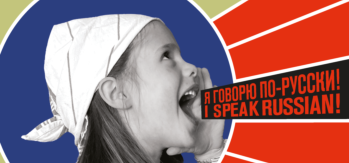3LM member Alla Peeters-Podgaevskaja recently published new work for a broad audience: her own book and a chapter in the Routledge review of current Russian heritage studies. Find out more about Alla’s work in this blog!
I speak Russian: The Russian language and child multilingualism. Alla Peeters-Podgaevskaja (2023).
The book analyzes the acquisition of the Russian language in both a monolingual and a multi-lingual context. It describes a set of possible trajectories and scenarios for how people with different types of multilingualism and language mastery acquire different domains of Russian. Additionally, other languages which occur quite frequently in combination with Russian, are discussed, and practical advice is given on how to raise a Russian-speaking multilingual person, although avoiding the reduplication of the information which can be found on various websites and forums, or in printed sources. Alongside many theoretical accounts, experimental data, and parental diaries, the book also includes personal observations and thoughts, originating from more than 20 years of own experience in raising bilingual children and teaching bilingual students at a Russian Saturday school and at the department of Slavic languages and cultures of the University of Amsterdam. This book is recommended not only for students specializing in language acquisition theories, but also for teachers, parents, multilinguals themselves and anyone else with an interest in these matters.
Order the book via this link.
Olessya Kisselev, Oksana Laleko, and Irina Dubinina (eds.). 2024. Russian as a Heritage Language: From Research to Classroom Application. London and New York: Routledge
This book brings together linguistically and pedagogically oriented research traditions in a comprehensive review of current Russian heritage language studies. Divided into three parts, the collection offers a variety of frameworks and approaches spanning research on HL speakers’ linguistic and pragmatic competence, literacy development and sociocultural characteristics of Russian in diaspora. Russian as a Heritage Language serves as essential reading for HL educators and researchers as well as for linguists studying bilingualism.
The book consists of twelve chapters, a.o.:
• ‘Linguistic Knowledge and Proficiency Assessment in Heritage and L2 Russian: Classroom Implications of Experimental Findings’ (Tania Ionin and Tatiana Luchkina),
• ‘Pragmatics of Requests in Heritage Russian: Implications for the Classroom’ (Marina Avramenko and Natalia Meir),
• ‘What Eye Movements Can Tell Us about Reading in Russian as a Heritage Language: From the Lab to the Classroom’ (Olga Parshina, Irina Dubinina, and Olesya Kisselev),
• ‘Past the Second Generation: Social, Familial, and Individual Factors in Maintaining Russian as a Heritage Language in Israel’ (Marina Niznik),
• ‘Writing Proficiency Development in Learners of Russian as a Heritage Language in the Netherlands’ (Alla Peeters-Podgaevskaja).
In this chapter, the importance of heritage language schooling and development of written skills (especially regarding task requirements, text construction, and syntactic complexity) are addressed in a longitudinal study (the ages of 10, 12, and 16 years) of a small cohort of Russian heritage learners in the Netherlands. The results show that development of writing proficiency is an intentional, conscientious process, and that syntactic complexity and functional adequacy benefit the most from the teacher’s guidance as well as the use of teaching materials that highlight different text genres. The chapter also discusses best pedagogical practices in teaching writing to heritage learners of Russian.
Order the book via this link.
